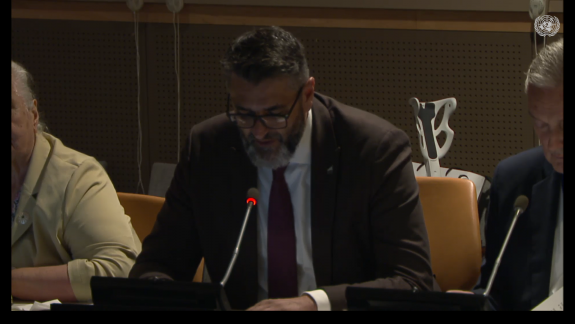Announcements
The international conference "Empowering through Remembrance" took place at the Srebrenica Memorial Center, where participants from diverse backgrounds gathered to discuss and emphasize the importance of intergenerational responsibility. Key topics included the impactful role of survivor testimonies, the critical need for education in preventing future atrocities, and the collective commitment to fostering a more just and compassionate global community.
Dr. Emir Suljagić, Director of the Srebrenica Memorial Center, delivered the opening remarks at the international conference "Empowering through Remembrance," during its first panel session. The session featured speakers who are survivors of the genocide in Srebrenica and the genocide against the Tutsi in Rwanda, alongside H.E. the High Representative in Bosnia and Herzegovina.
The first panel, "Importance of Survivor Testimonies," featured compelling narratives from Munira Subašić, Freddy Mutanguha, and Hajrudin Mešić.
‘’Forgetting the dead ones means killing them again. None of those killed know the reason of death. Schools were often the places of execution. Students who learned their first letters in those places were killed there. Sharing a story is not easy, it is digging in yourself. After telling the story, I dream. That is genocide in slow motion.’’ - Prof. Hajrudin Mešić
‘’Our children are our future. By educating them we are making an enormous step in preventing future genocide.” - Munira Subašić
“I have lost parents and four sisters in genocide in Rwanda. I am here to tell the story of what had happened with a hope that will not happen again.” - Freddy Mutanguha, CEO of The Kigali Memorial in Rwanda
The second panel, "Intergenerational Responsibility," highlighted Ajna Jusić, Tali Nates, and Helen Connolly.
"It is very important for me to be here in Srebrenica again to remember and reflect on the crucial role of education. I do so both as a daughter of Holocaust survivors and as founder and director of the Johannesburg Holocaust & Genocide Centre." - Tali Nates
Ajna Jusić, founder of the Zaboravljena djeca rata / Forgotten Children of War Association has achieved a historic milestone. In 2023, her efforts led to the enactment of the first law in the world granting special rights to children born of wartime rape. This law provides increased social protection and addresses years of stigmatization. Despite facing significant challenges and societal reactions, Ajna bravely pursued justice. Driven by the truth and her unwavering belief in her mother's innocence, she continues to fight for the rights of these marginalized individuals. Ajna highlighted these achievements and struggles during her address at the panel on Intergenerational Responsibility.
Honored to be in Srebrenica for the Conference, standing with survivors and the Memorial Centre at this crucial time. The conference is a significant opportunity to reflect on the life-confirming theme of inter-generational responsibility. As many of us from all over the world meet in the impressive Memorial Centre today, we will do so with this same commitment to life, truth, dignity and to children and youth. This is a hopeful endeavour, and it is one that future generations deserve."- Helen Connolly, University of Bedfordshire
The final panel, "Education as a Catalyst for Change," featured Melani Cammett from Harvard University, Jasmin Mujanović - Senior Non-Resident Fellow at Newlines Institute, David Simon from Yale University, and Adam Mendelsohn from the University of Cape Town.
Melani Cammett, as a panelist on the "Education as Catalyst for Change" panel, emphasizes that education equips individuals with essential knowledge. "This knowledge is pivotal in comprehending our history and past events, facilitating deeper understanding and empathy. These foundations are indispensable for meaningful discussions on justice and reconciliation."
Education about genocides is important not only for children but also for adults, as discussing these atrocities is crucial since they shape the world we live in." Dr. David Simon has shared insights into his extensive work on mass atrocity prevention, highlighting case such as Rwanda.
"It's deeply moving and meaningful to take part in a conference focused on memory at the Srebrenica Memorial Center during this significant moment. As a South African, the Center's efforts are inspiring for everyone committed to honoring the memory of those who endured past injustices." - Adam Mendelsohn, University of Cape Town.
Bosnia is the only country in the world in which genocide has been localized to a single municipality, where atrocities committed against the same people by the same political actors at the same time towards the same political ends are excluded from the official narrative.” - Jasmin Mujanović
"Thanks to these three panels and all the speakers who contributed, along with everyone in the audience, today we've accomplished something significant and gained valuable insights. The panelists have provided us with deeper understanding of issues crucial to our community, inspiring us to contemplate important matters. We also extend our thanks to the audience whose presence contributed to an atmosphere of open dialogue and learning." - closing remarks of today's conference "Empowering though remembrance: Upholding Intergenerational responsibility" by director Dr. Emir Suljagić
As the conference "Empowering through remembrane: Upholding Intergenerational responsibility" concluded, moderator Dr. Dževada Šuško emphasized the significance of the insights gathered and the shared responsibility felt among participants. She highlighted the reaffirmed importance of remembering, the impactful role of survivor testimonies, and the critical role of education in advancing a world committed to justice and human rights. Šuško urged everyone to uphold the legacy of those who suffered and perished, ensuring their stories continue to inspire efforts towards a more compassionate and just global community. We express gratitude to all attendees for their contributions and encourage ongoing dedication to empowering through remembrance.












